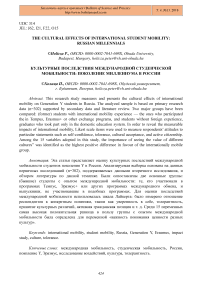The cultural effects of international student mobility: Russian millennials
Автор: Holicza Peter
Журнал: Бюллетень науки и практики @bulletennauki
Статья в выпуске: 11 т.4, 2018 года.
Бесплатный доступ
This research study measures and presents the cultural effects of international mobility on Generation Y students in Russia. The analyzed sample is based on primary research data (n=302) supported by secondary data and literature review. Two major groups have been compared: (former) students with international mobility experience - the ones who participated the in Tempus, Erasmus+ or other exchange programs, and students without foreign experience, graduates who took part only in the domestic education system. In order to reveal the measurable impacts of international mobility, Likert scale items were used to measure respondents’ attitudes to particular statements such as self-confidence, tolerance, cultural acceptance, and active citizenship. Among the 15 variables adopted in this study, the importance of seeing the value of different cultures” was identified as the highest positive difference in favour of the internationally mobile group.
International mobility, student mobility, Russia, generation y, erasmus, impact study, culture, tolerance, поколение y
Короткий адрес: https://sciup.org/14114896
IDR: 14114896 | УДК: 314 | DOI: 10.5281/zenodo.1488396
Список литературы The cultural effects of international student mobility: Russian millennials
- Severgnini B. Manuale dell’imperfetto viaggiatore. Milan: RCS Libri, 2005.
- Holicza P., Fehér-Polgár P. The role of IT in international student mobility: The Y-generation case // 2017 IEEE 15th International Symposium on Intelligent Systems and Informatics (SISY). IEEE, 2017. P. 147-150.
- Van Mol C. Intra-European student mobility in international higher education circuits. Basingstoke: Palgrave Macmillan, 2014. DOI: 10.1057/9781137355447
- Lazányi K., Holicza P., Baimakova K. Different Cultures Different People // Exploring the Influence of Personal Values and Cultures in the Workplace IGI Global. 2017. P. 183-200.
- Ziyatdinova J., Osipov P., Gornovskaya A., Zolotareva N. Factors and Barriers of Inbound International Student Mobility in Russia // Auer M., Guralnick D., Simonics I. (eds). Teaching and Learning in a Digital World. ICL 2017. Advances in Intelligent Systems and Computing. Vol. 716. Cham: Springer, 2018.
- Chhokar J. S., Brodbeck F. C., House R. J. Culture and Leadership Across the World: The GLOBE Book of In-Depth Studies of 25 Societies. Mahwah: Lawrence Erlbaum Associates, 2007.
- Hofstede G. Culture’s Consequences: Comparing Values, Behaviors, Institutions, and Organizations Across Nations. Second Edition. Thousand Oaks CA: Sage Publications, 2001.
- Hofstede G. Dimensionalizing Cultures: The Hofstede Model in Context // Online Readings in Psychology and Culture. 2011. V. 2. №1.
- Hofstede G., Hofstede G. J., Minkov M. Cultures and Organizations. Software of the Mind (3rd ed.). McGraw-Hill, 2010.
- Luhmann N. Trust and Power. Chichester: John Wiley & Sons, 1979.
- Lazányi K. A társas támogatás szerepe egy individualista társadalomban // A Virtuális Intézet Közép-Európa Kutatására Közleményei. 2012. V. 4. №2. P. 51-58.
- Holicza P. Civilizációs Törésvonalak Európában: Magyarország és Szomszédai a Hofstede-Dimenziók Tükrében // Hadmérnök. 2016. V. 11. №4. P. 210-215.
- Holicza P. Understanding Magyar: An Analysis of Hungarian Identity within the Framework of Cultural Dimensions Theory and Additional Metrics // 4th International Scientific Correspondence Conference, Slovak University of Agriculture in Nitra. 2016. P. 118-124.
- Lazányi K. A biztonsági kultúra // Taylor IV. Vezetéstudományi Konferencia. 2014.
- Shi X., Wang J. Interpreting Hofstede Model and GLOBE Model: Which Way to Go for Cross-Cultural Research? // International Journal of Business and Management. 2011. V. 6. №5. P. 99.
- DOI: 10.5539/ijbm.v6n5p93
- Trompenaars F., Hampden-Turner C. Riding the waves of culture: Understanding diversity in global business. Nicholas Brealey Publishing, 2011.
- Malovics E., Pronay Sz., Kincsesne V. B. Az "Erasmus-nemzedék" útra kel - Y generációs egyetemisták külföldi utazási motivációinak és szokásainak feltárása // Marketing & Menedzsment. 2015. 1. P. 43-57.
- The ERASMUS Phenomenon-Symbol of a New European Generation? / Feyen B., Krzaklewska E. (Eds.). Vol. 1. Peter Lang, 2013.


